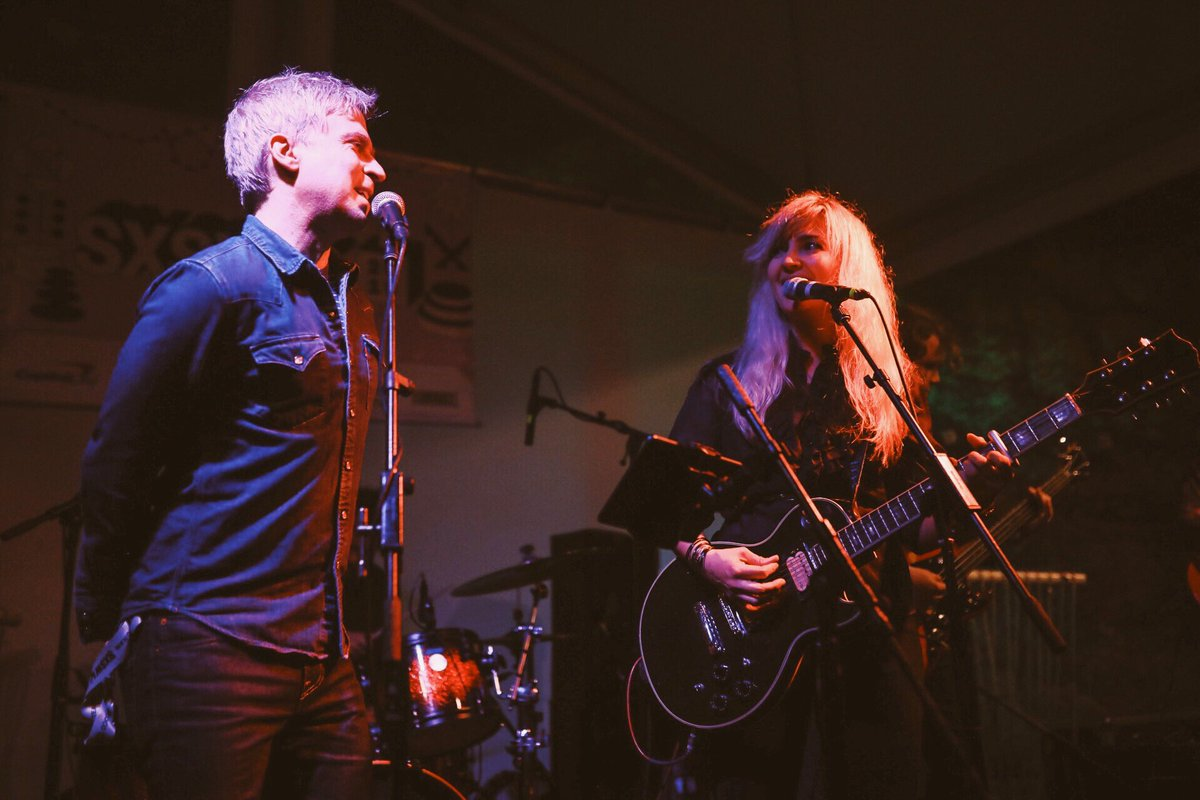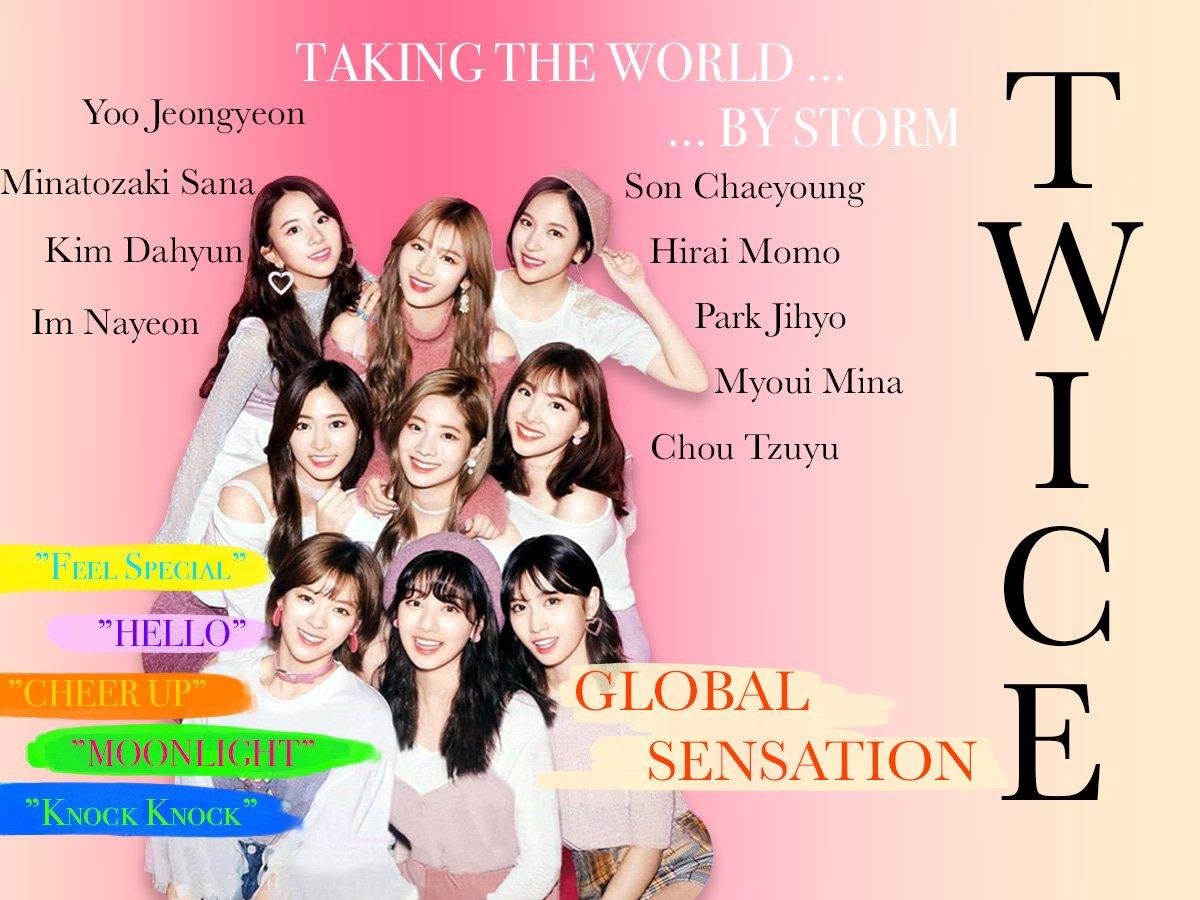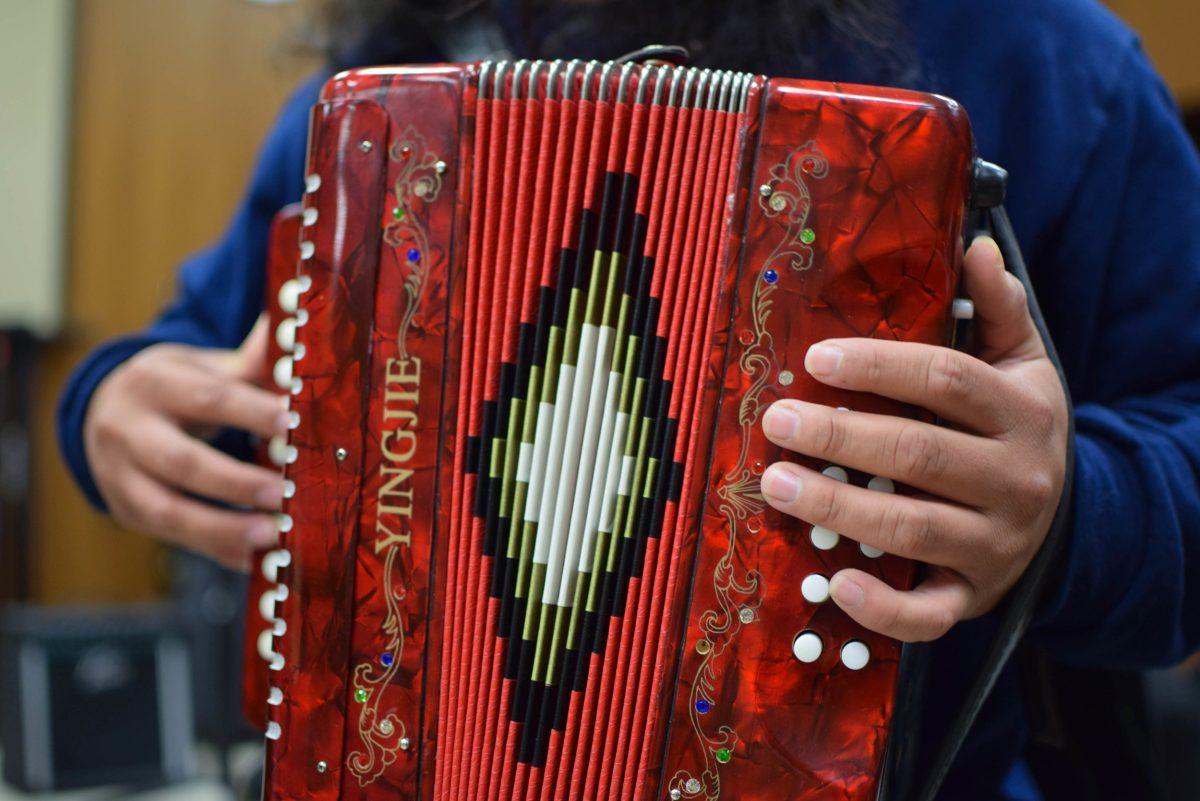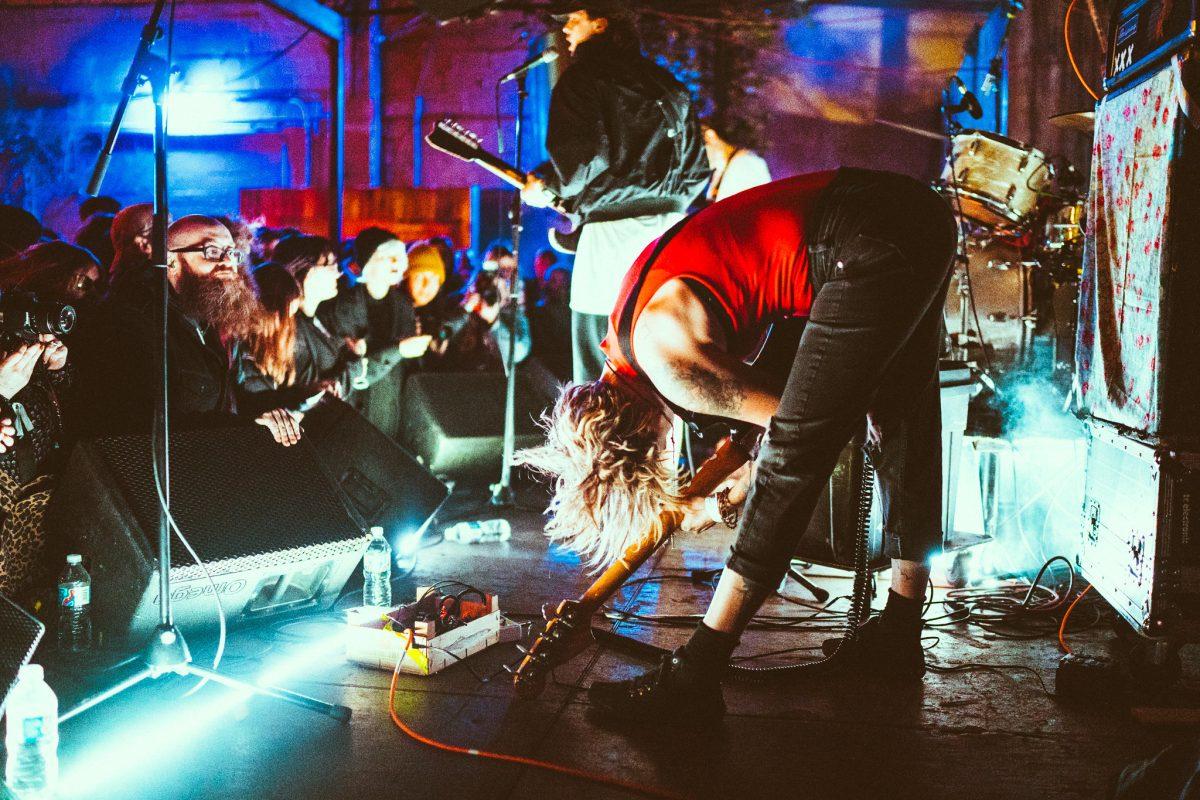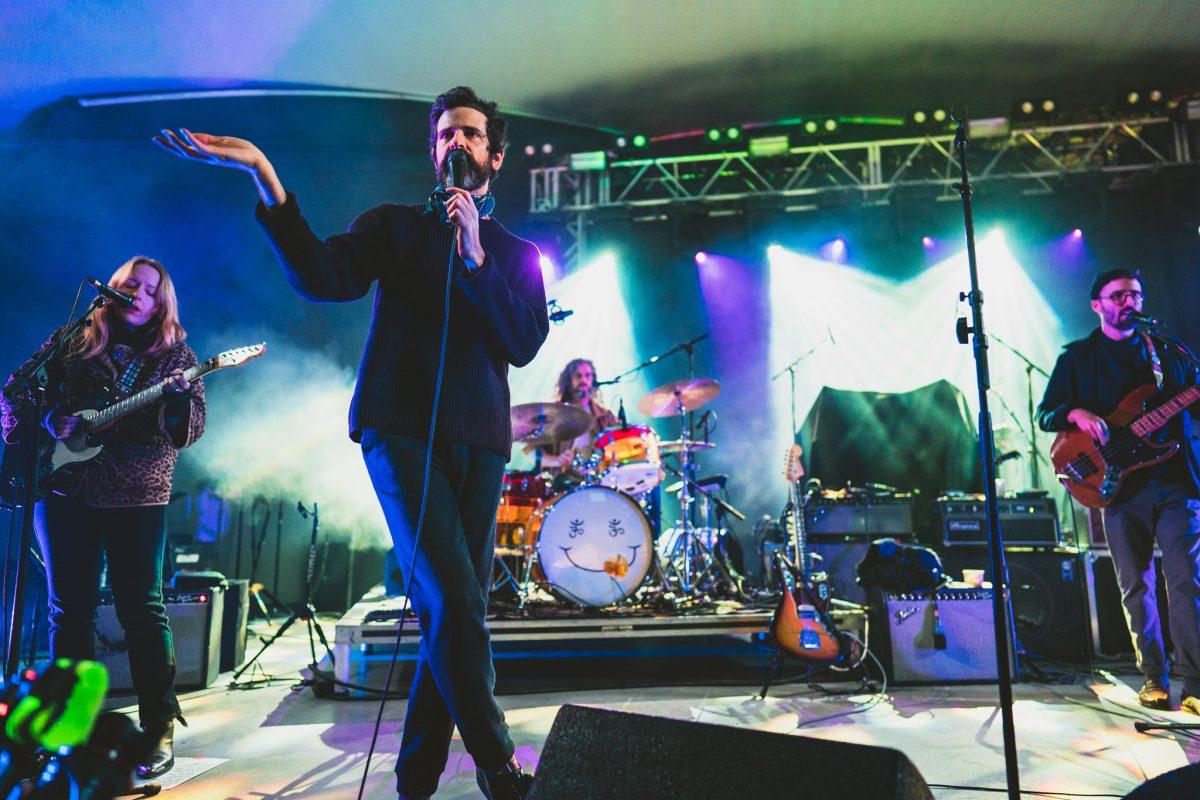Moving Panoramas live at Empire Garage, March 11, 2019. Photo by Ted Chase
Austin band Moving Panoramas make dream rock that’s captured the attention of the Austin Chronicle and National Public Radio. Their long-awaited sophomore LP “In Two” came out this February, and the band has returned to the familiar stage of SXSW to some unfamiliar faces. ORANGE caught up with band leader Leslie Sisson to discuss the struggle of being a working musician in Austin, how Moving Panoramas songs come together and why South By 2019 has been the best yet.
Story by Carys Anderson
Photos by Ted Chase and Bryan C. Parker
What have you been up to today?
I am at my job and I just stepped out. So this is better than tomorrow, tomorrow’s going to be crazy– they’re trying to get me to work tomorrow, and I don’t want to, so I’m trying to cram everything in today.
And you work in TV editing?
Yeah, I’m a television editor for a reality show. Non-stop hours.
How often do you do that?
About 60 hours a week, Monday through Friday or Saturday, usually. It’s a lot.
And you’ve been playing South By shows, you play tonight (3/12) at Cheer Up Charlie’s. How do you balance that?
I lose my mind a little bit. I lose sleep. Since I’m a contractor, I have to work or I lose money, so it’s not like having a regular day job where you can take vacation time. I don’t get benefits and I don’t get paid time off and if I miss a day I lose a big chunk of change. So this week I asked for a few days off and I hope I don’t have to come in. It’s just, with deadlines and things, in television and things it’s just escalated crazy because there’s a whole team of people scrambling to get something done. But they know that I’m a musician, and part of being a musician is people with full time jobs and schedules and benefits don’t want to hire you because they’re afraid you’re going to have late nights or go on tour– things like that. It’s been a struggle for the past 20 years of my life, trying to balance music with a career, and it’s been hard. And this week is especially hard because we play almost every night.
It looks like you’ve been playing a lot of shows recently.
Yeah, we don’t– we didn’t book any day shows except one KUTX thing in the morning, but that’s before I go into work. I strategically book things to be in the evening so I can at least try to get some work done in the day, but it’s been really hard. Loading out at 3 a.m. and then getting into work at 10 a.m., which is usually late for me. It’s been pretty challenging this morning and yesterday, but it’s life, you know?
Does living in Austin, now that it’s getting so expensive, influence your working schedule?
Definitely, yeah. It’s more expensive to live in Austin for sure, that does make things more challenging. But just in general, it’s just challenging to try to balance music with a job anyway. Especially where our band is right now, we’re real busy, and we don’t have management, we don’t have a real booking agent. So I basically do everything for the band and the label does the rest. So it’s like a full time job, me managing this band right now. Also being the songwriter and the performer and everything, it’s a lot. But then my job, the career that I have, it’s not like I have an office job with down time, so it’s not like I can do band work at work. So sometimes I clock in 80 hours at my job– that’s already two full time jobs. And so it’s difficult. I won’t lie, that the reason it took so long for this record to come out– I had some health issues, but it’s also because I was working to pay for everything. So it’s hard to make a record when you’re working a full time job.
So yeah, Austin’s not cheap anymore. That definitely affects it. But it’s also just the life in general. You do music because you love it, you don’t do it because you want to make a living doing it. And I never expected us to us have the response that we did, I just thought it was going to be a fun thing, so I’m trying to keep this momentum going because if people are digging it, then I wanna keep doing it.
How have the shows been so far? I know this is at least your second time playing South By.
We’ve played every year for the past four or five years, I think. But this has definitely been the best response we’ve had yet as a band. We’ve played South By with some bigger bands and had a good opening slot, but now people– it seems like they’re coming to see us now, which is cool. It’s been great. I’m very grateful that KUTX and the Chronicle, locally, people are supporting us. And then nationally we’re getting a lot of radio play, so I feel like people from out of town are coming to check it out too. It’s been the best South By Moving Panoramas has had yet, so it’s been great.
Moving Panoramas leader Leslie Sisson with Matthew Caws of Nada Surf, who contributed to In Two track “In Tune.” Photo by Bryan C. Parker
Nice, and with a larger band, how’s that going?
Sounds better than ever too. The more the merrier, the more people there are, the bigger the sound. So yeah, the live sound is better now with the bigger band.
And you’re not playing guitar right now?
I am. I still play all the stuff, I just bought an extra guitar. We brought an extra guitar in when I injured my hand, and it just sounded better, and so we decided to keep it. All the records have two guitars on it anyways, so she’s just playing everything that I played, doubled up on the record. But it’s also just a good– it gives my hand a break. I can take a break on my hand now, because I might have some joint issues in my hand right now that I’m still trying to figure out what’s wrong with. So sometimes during songs I’ll put the guitar down or I’ll stop playing halfway through and it sounds great. So it’s helped the sound, but it’s also helped my poor ole’ hand.
So the record’s been out for about two weeks; when did you finish it?
About a year ago. Actually, this time last year we finished mixing and mastering it. We’d hoped it was coming out last summer, but we just were at the mercy of the label’s schedule, so we had to time it right. We thought we maybe had a tour last fall with another band opening, so we were gonna try to release it then, and then that fell through, so we decided to wait and push it to right before South By so we could try to get some of these missing pieces with the management and booking that we don’t have.
How’s the response been? You guys have been getting a lot of press with KUTX.
Locally, I couldn’t ask for more. We’re very grateful for KUTX and the Chronicle and the Statesman, all the local support we’ve been getting. Even all the other radio stations are supporting us. People have been coming to the shows. Our release show, we took a chance and did it at Barracuda, and we’ve never– I think the last time we headlined at Barracuda, there were like 20 people there and it felt really small. It felt really empty. So I was kind of scared– that was a long time ago, that was like a year and a half ago, and we didn’t have anything out at that time, it was a weird show– I was like, ‘Man I’m kind of scared to play this room because it’s so big. I just want there to be at least a hundred people there.’ And I guess by the time we played we were at capacity. I guess that’s like selling out. I’m just glad people are coming to the shows and people are responding to the music and the story behind it and everything. It’s been good. I’m very grateful. Now, it’d be nice– I guess step three is trying to get out of, trying to get that response outside of Austin, which is the hardest part. But if we only end up getting this type of love in Austin, I’ll take what I can get, because home is where the heart is.
You mentioned earlier one of the things you’re happy about is the response of people connecting with the songs, and I realized you’re very clear-eyed more so than other artists about what your songs are about, or more forthcoming about it. A lot of artists say their inspiration was more subconscious or abstract or they just don’t want to tell you. So I’m wondering– when you do sit down to write a song, since you’re so clear-eyed about what it’s about after the fact, do you know going in? Or is that just something that you realize after?
It depends. Every song varies. Sometimes I’ll just sit down with a melody and a song can come from that, and then sometimes I do have an idea. And I do take notes and I’ll write lyric ideas down constantly, just when I’m out and about. And notes will formulate into songs. The second song on the record is one where the concept came before the music, because I had all these words that I wanted to make into a song. It was like two stories that I combined in one. But every song on the record has a couple of meanings. So the meanings kind of elaborate as the songs grow. When I sat down with “Baby Blues” I had a specific thought in mind, and I wanted to write a song about what I was feeling at that moment. It’s weird. It just kind of comes out. But it ends up becoming a clear, concise idea once I round it out and it’s done. It doesn’t take me very long to write a song when I’m in the zone, but I could have writer’s block and it could take a while. But this record came out– it was like a floodgate of words and melodies. So I guess there were things that I needed to sing about that I didn’t really know.
Was there anything on the record you were particularly proud of writing, or was anything difficult to write, more so than anything else?
I mean, I’m proud of the whole thing. “Forever Gone,” I wrote that right after SXSW a couple years ago because our drummer’s mom passed away while he was playing SW, so he had to leave really quickly to go to her service and we got a drummer to sit in with us, insanely, for the last couple shows. When his mother passed away– she struggled with similar issues that my mother struggled with– and so I’m really proud of that song because I literally woke up from a dream about my mother and just started writing it, kind of as a tribute to his mother too. His mother dying kind of dug up a lot of things about my mother dying. I’m proud of my mother’s influence on this record, and I didn’t realize how much influence she had on me until she was gone. She’s all over this record, probably on every song, her influence just on me as my mother for my entire life, my supporter. I’m very proud of that and I’m very sad that she’s not around to hear it, but I wonder if she wasn’t gone if I would be tributing her so much. So there’s this– the catharsis in that is pretty intense; I’d give up all of this just to have her back. But I guess it’s the best way I can honor her in her death. So yeah, I’m proud of that. I’m really proud of that.
At first, reading about you and your country band as well, I didn’t really hear your country influence in Moving Panoramas, so I was wondering if that was a thing you considered separate. But then when I got to “Whiskey Fight,” I sort of heard it there. So I thought it was funny that the song I heard the country influence was named after whiskey, because I feel like that’s fitting. And then of course I read that you originally wrote it as a country song. So I’m wondering if you do think that Moving Panoramas has your country influence in it, or if you feel like it’s a separate thing?
I mean, country’s my roots. I’m from Texas, my father was in a country band, I grew up with country music. And I tried hard to get away from it when I was a kid; I don’t know why I tried to get away from my country roots– they just weren’t for me when I was a young punk rock kid. But now I’m embracing it because it reminds me of the good times. Until I had the country band, I didn’t realize how much easier it was, once I started studying more country music and learning more country music from my roots, it was so much easier to say what I wanted in a country song, for some reason. I don’t know why– I don’t know if it’s just more accepted. Country music, you can talk about your dog dying and your wife leaving you and you losing your job, all that stuff that it’s free; you’re much more free to talk about it. And I also consider myself a funny person, so I like to think that I can be a little bit more witty. In the rock and roll and the punk rock and the little bit more dreamier, dark stuff, I was always trying to be obscure in what I was doing. So I always kept them separate. I didn’t start seriously composing country music until the past few years when I had this country band that kind of happened accidentally. And then because of those two bands, it happened accidentally that they merge. But country is definitely a solid foundation for what this stuff is built on. And “Dance Floor” and “Whiskey” and “Forever Gone,” those songs are definitely– the country is bleeding out more in them. But it’s all part of it.
Do you approach your songwriting from any traditional or theory background?
I studied music for a long time, like half my life. I went to college to study music. And it was in college when I realized I didn’t want to study music anymore. I felt like I was losing my edge; I was losing the simplicity of being able to express myself because I was learning more and more rules and boundaries. I just like things that sound pretty. I like melodies that appeal to me. It’s beauty. Even when I started writing music after music school, everything I was writing was so technical. I was trying so hard to be different and doing like mathy kind of stuff, nerdy kind of stuff. And it was cool shit, but I still felt like I was alienating. I didn’t realize at the time that I was alienating people. I was hiding behind this technical work and I wasn’t freely expressing myself because I had something to prove, I think, when I was a young 21 year old trying to write songs in bands. I think I learned less is more when I started teaching music to kids and realized all these freaking songs in the world that I love so much have like, 3 chords and there’s really simple structure. So I pulled the reins in and then it seemed like I was able to express myself more freely. So music school may actually have kept me from doing this kind of music, so I’m glad I left. But I’m glad I learned what I learned.

































